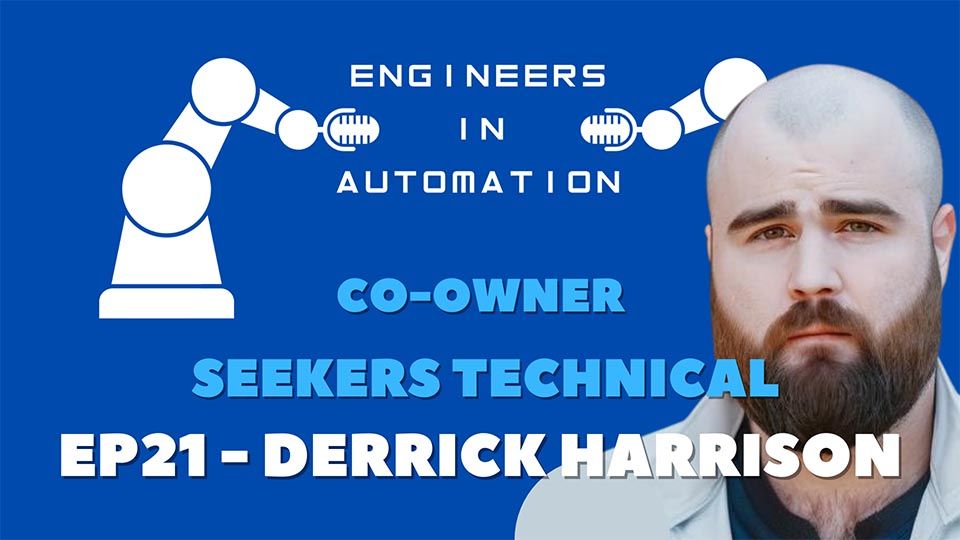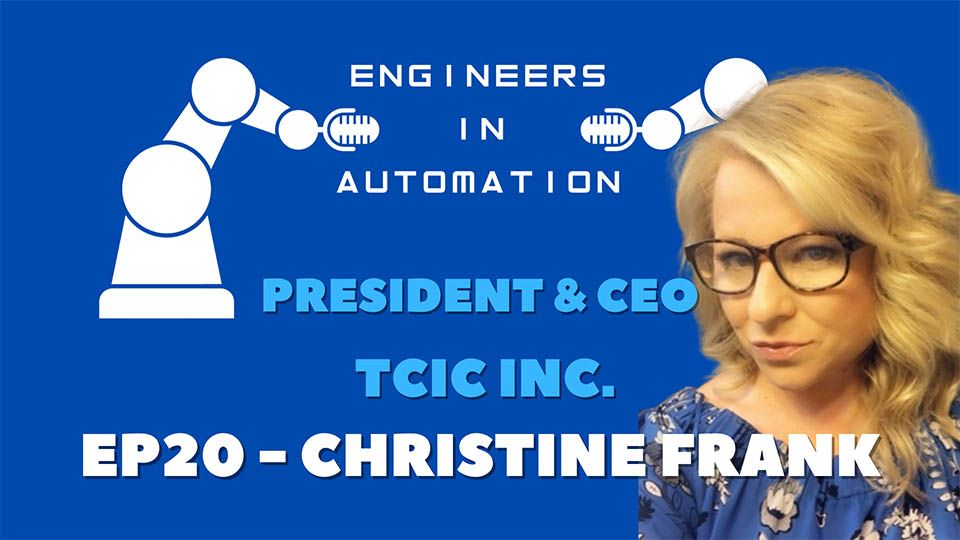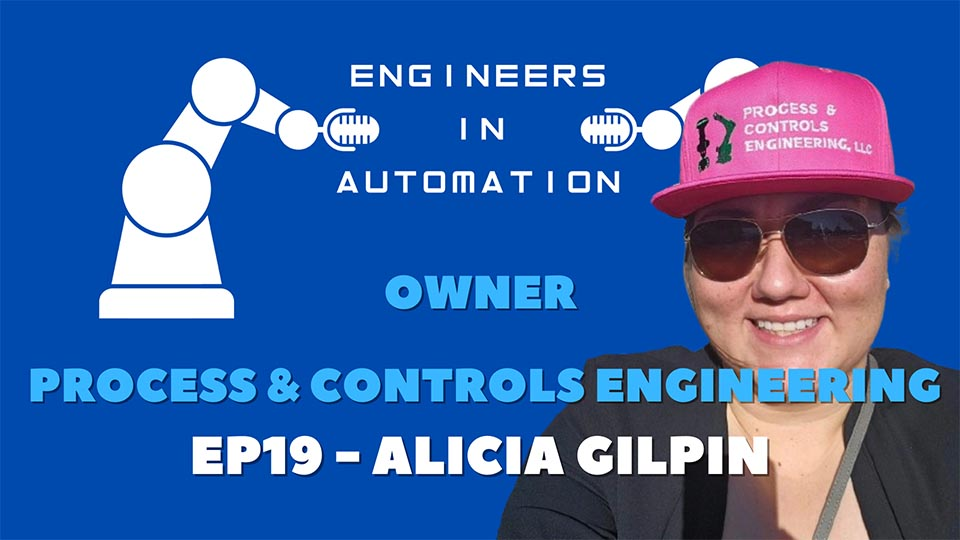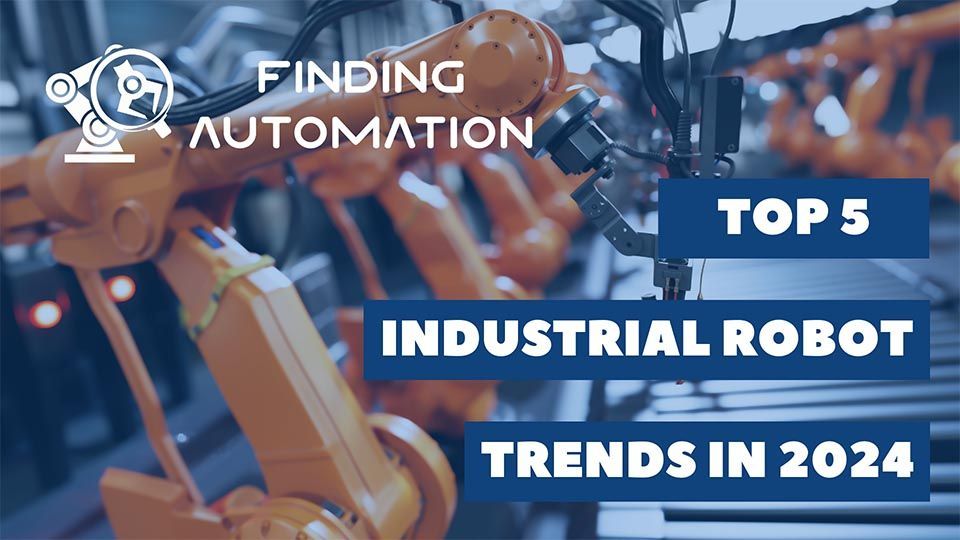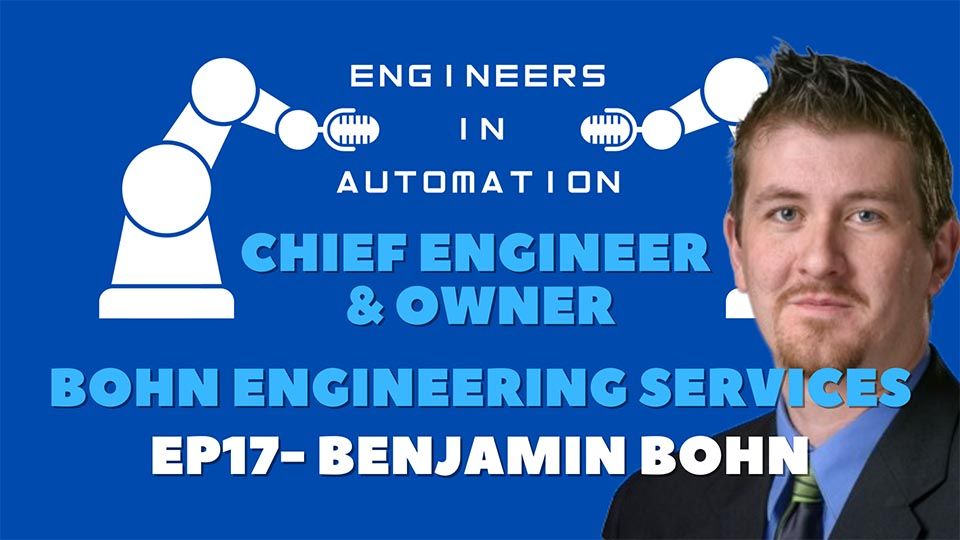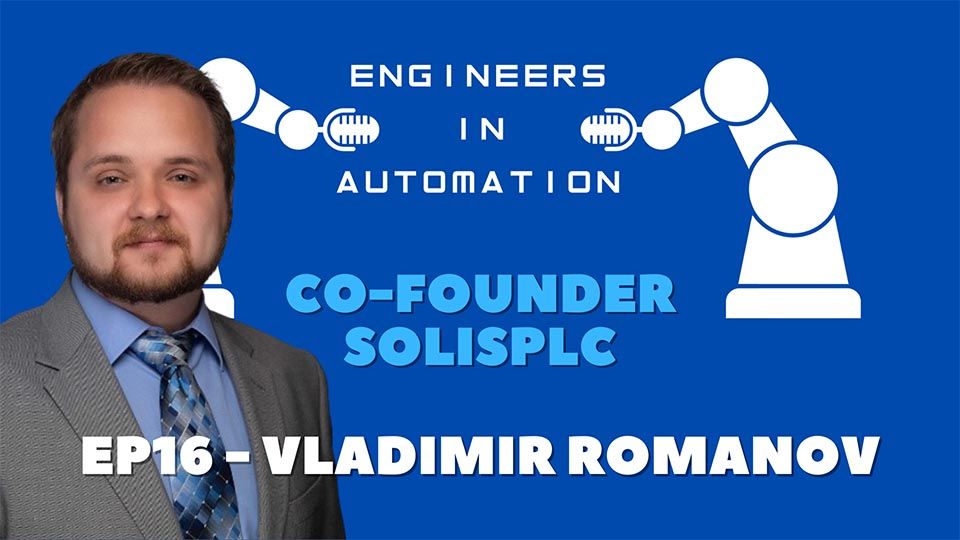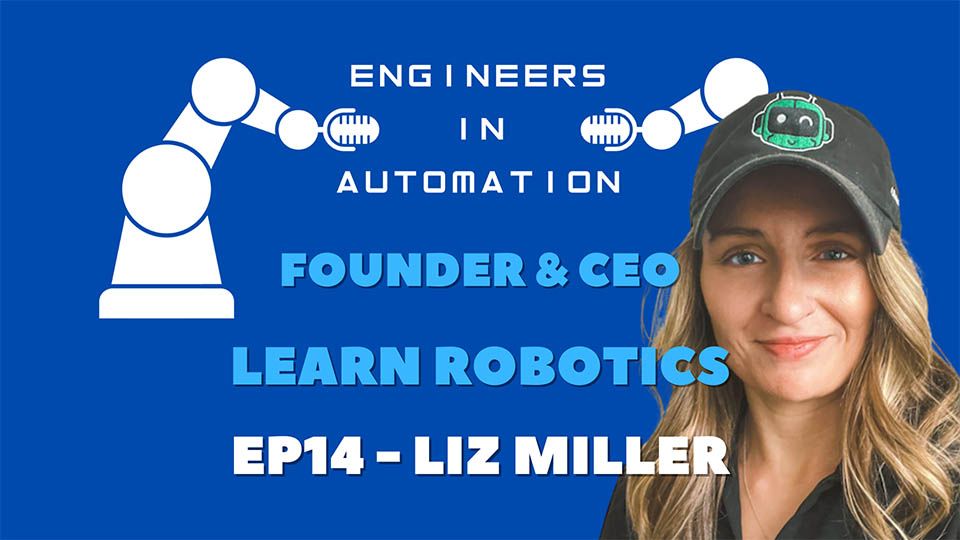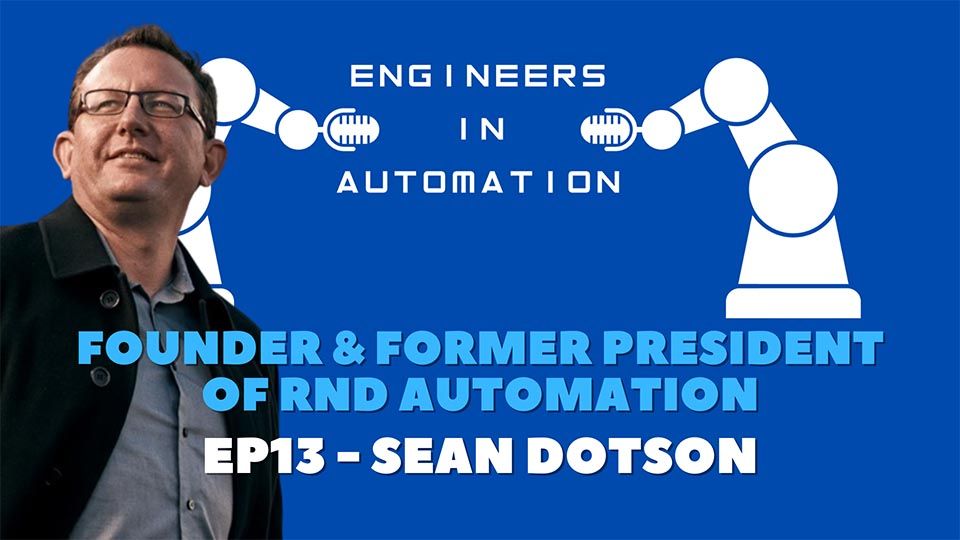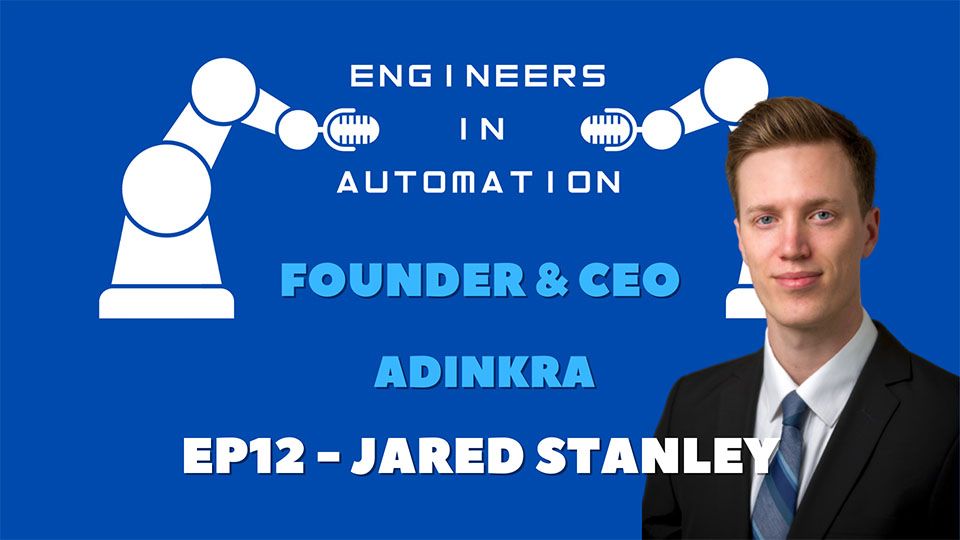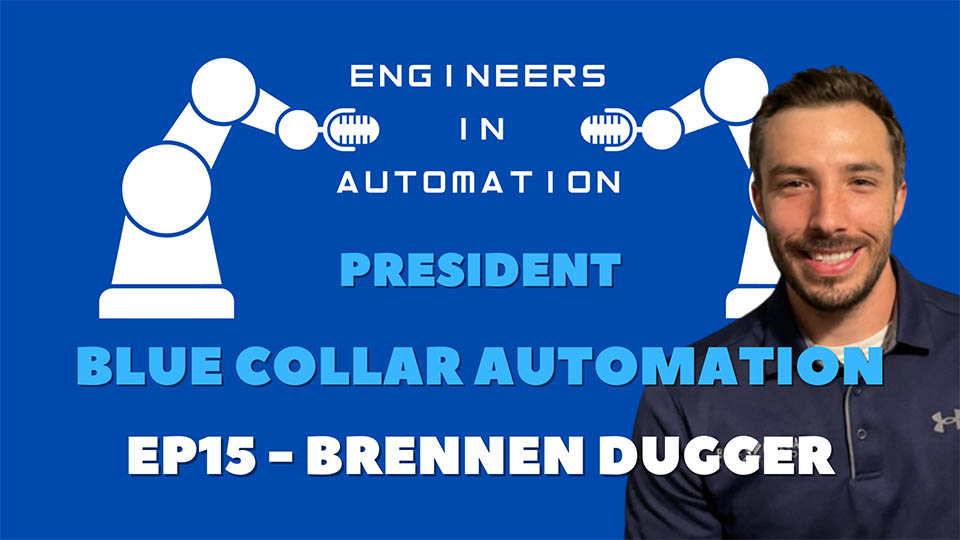Jacob Sanchez | Automation Industry Analyst
Engineers in Automation - Jacob Sanchez Episode 18
In this episode, we discuss with Jacob Sanchez how he got his start in the automation industry. We discuss why he thinks his social media following has grown so large and how to build your unique following. He also talks about becoming more comfortable in front of a camera and gives a few tips on public speaking. We also discuss his future plans for helping the younger generation get involved with manufacturing and automation.
WATCH THIS ENGINEERS IN AUTOMATION EPISODE:
Keegan Dillon – Host (KD): Hi, my name is Keegan and I'm the host of Engineers in Automation. On today's episode, we're going to be talking with Jacob Sanchez. He's an industrial analyst and a social media content creator. We're going to talk a little bit about his background getting his start in automation. We're going to talk about his current role as a host on a very popular YouTube channel. We're also going to talk about his current roles and what he does in his free time. Now, let's go talk automation!
KD: And welcome to episode 18. I'm here with Jacob Sanchez. He's an industry analyst and content creator. Jacob, welcome to today's show.
Jacob Sanchez – Guest (JS): I'm hyped brother. How's it going, everybody?
Jacob Sanchez International Robot Exhibition In Japan
KD: Great. It's great to have you. And also great, you're the last one of the year. So, I appreciate you joining in December here. How are things going for you so far this year? Can you give us a little bit of, you know, how's your year been since we're close to year-end right now?
JS: Good. I mean, I literally just celebrated how much of a good year I've had by going to Japan for 20 days. The whole reason for that one, one of my buddies in the end industry, Chris Elston, he works for a YRG Robotics for Yamaha. He threw out this idea of “Hey, one of the biggest robotic shows in the world happens in Japan every two years, blah, blah, blah.” I was like, “Oh, yeah, yeah, that's cool. It's cool. I'll go, I'll go,” and I wasn't gonna go.
And as I got closer, towards the end of the year, I was like, you know, what all the success that I've had and been lucky enough to have and humble enough to have the experience I've had like, celebrate a little bit. So I planned this whole trip and went out there for a four-day robotics trade show. And then the other like 15 days was just traveling through Japan.
Difference Between Trade Shows in NA vs Japan
KD: Oh, cool. I bet that was absolutely amazing. Let me ask though, what were some of the things that you noticed that are different from trade shows over there than they are from over here, maybe in North America.
JS: So that was one of the coolest, like the reason I wanted to do this was for the vacation, but also for would like the experience of seeing how business is done in general in a foreign country. And when it comes to trade shows, in particular, I loved I'll start with something I loved. And it's something I thought was just a little I won't say it was bad, it was just funny.
So, I loved that. It didn't matter that if it was in the US, Japan, I bet it doesn't matter if it's in Europe, they have a focus on educating and education. So, on Saturday, they redid like a portion of one of the halls. Busted everything out of there, and turned it into like this play area of education for kids to come in. They had a VEX Robotics area where kids can actually come and sign up for times and build a robot. You can do a little like test competition. There was like this paper mache business thing where they could build like these apes and bugs and stuff and then fight with them or something.
There was a maze-running robot, and the kids could make their own little maze. And then they talk about how the robot uses vision to see blockage and it remembers where the blockages and it will path its way to eventually find the exit.
There was aquatic robots that the kids could drive and learn about. Um, that was it was refreshing to see that and know that these trade shows everywhere. I hopefully everywhere around the world realize the emphasis you need to put on educating people, like just ordinary people just to kids to just have fun, like not none of that stuff was like, “Oh, hey, if you're if you're gonna drive this aquatic robot, this is gonna be your job and like 20 years, blah, blah, blah.” It was just having fun, cool. It was just fun. There was some VR and augmented reality stuff for drones and things. That was cool to see.
KD: Very, yeah, very, very cool to get the younger generation involved there. I think you and like many others are always pushing for having the younger generation involved in teaching them about robotics and automation. So that's cool to see that they're doing that with their events there.
JS: That made me really happy. I'm a big I've been in education for a long time, even when I was in high school, still going to school. I was in education, teaching teachers and we'll get into that later. But one of the things that I thought was funny was how many parts of people's booths that had these big like do not film signs on it, but the product that they didn't want you to film was like a product release like it was like a new product.
They're like, “Hey, here's this new product, check this out.” But like, “don't show anybody.” And I'm like, and I may not understand it fully, but just a part of me was like, “if I have a new product out, like when Apple comes out with a new iPhone, they're not like, don't show off your iPhone.” You know what I mean.
KD: Don't show anybody you just bought this.
JS: I thought that was pretty interesting. I had some leeway because I was press. So I actually got a press badge for all the show. I got to talk with the show owners and a lot, lots of cool stuff. But even some of the things that booths even the press badge that people were like, “no, like, do not film this.” I was like, “okay.”
KD: Interesting. Yeah, weird, I've never heard of that, especially if you are literally showing everyone your product at a show like that.
JS: Like one of the guys told me too, I was like, “Well, what is this?” And they're like, “Oh, it's our newest product.” And I won't say what it was, but I was looking at and I was like, I've seen a product like this at least three other businesses. Like it's not that, innovative. You know what I mean? But I was like, “Oh, to each his own, okay,” you know.
Jacob Sanchez’s Start In Automation
KD: Cool. And let's back up just a second here, then let's go all the way back. How did you get your start in automation, then?
JS: Yeah, my start automation didn't come until I got a start in manufacturing. So, CNC machining to be specific. And this came from like me having nobody in my family in this background. I never knew this industry existed. I thought engineers were like Tony Stark growing up in Iron Man. So, I obviously thought it was like, impossible. It's like a fantasy to be an engineer. And so that was my that was my idea. That's all that I had in my head about this industry.
The only reason that I even got into a manufacturing class in freshman year of high school, is because I moved to a new place my I had to follow my mom's job, because single mom and all that. So wherever the job went, we had to go. Move to a new place. No friends, no family, picked my high school. And then I was signing up for electives and stuff. And I was like, I wasn't a delinquent. I was a tough kid. I guess in school, I got like, tried to get C's and talked back when I probably shouldn't have. So that was me. And I was trying to get the easy A's.
So I signed up for cooking class, because in every high school movie ever, like you sign up for cooking class for an easy A. And obviously everybody else knew that so it was full, and the school throws you into whatever is open. And engineering class was open. And I was pissed. My first week of school, I found out my elective got changed. And I go into this engineering room with all these like computers. And the first like thing we did was you have to, like make a paper airplane out of construction paper, I hate arts and crafts, I was I can't express how mad I was.
So that was my first like, touchdown into the engineering manufacturing world. Long Story Short with that I didn't really dive into CNC machining is what I would end up getting into. Until like, I just asked the teacher because I didn't like going home. I was like, “Hey, can I just like, clean your shop,” and I don't have to go home, I will just clean your shop. And so I got to get away from the computers and see the CNC machines and see what a machine shop looks like. I was like, oh, that's kind of cool. Like, what's that sharp thing over there. And I learned outside of class how to like run a manual lathe, I made a ring and .01 lines for sets across the thing, dialed in beautiful. And people were impressed and they thought I bought and I was like “No, I made it.” And that made them even more impressed. I was like, “Oh, this is a skill like not everybody has.”
And I just went down that rabbit hole rabbit hole and I eventually started working for a company called Titans of CNC Academy. They're the world's largest teacher and distributor for education in the CNC machining realm. And I got hired by them right out of high school and became a five-axis machinist, programmer, setup guy, four-axis, running different types of CNC mills; Haas, FANUC, Doosan, DMG, and we ended up turning into like an education studio where we started doing videos teaching people. Getting sponsorships. I was on camera doing educational videos.
And then I found out about robots. So like it took me what how long was that five or six years in the CNC machining world before I even saw my first robot. And then once I found out about robotics and like automation, I was like, “Oh, dude,” and I was like “I love cutting chips, but I don't want to do it forever.” So I moved from California to Texas with this Titans of CNC company, and then had a company that I met at a trade show once. Hire me, Edgewater Automation from Michigan. So they flew me out from Texas to Michigan moved away from family and friends again to knowing nobody, and started my automation journey as an Application Engineer, which I did for, I think almost two years. Yeah, two, almost three years. Designing cells for, they were a custom automation integrator.
Jacob Sanchez Industry Analysis and Content Creator
KD: Yep. Yep. I'm fairly familiar with them being from Michigan as well. And then. So what are you doing now then what? What's on your plate now? I know you're fairly busy.
JS: So now I just left my engineering job, I think eight months ago, nine months ago. I'm an industry analyst and a content creator for an industrial marketing company. And I've also been putting a lot more time and effort into my own personal development of my brand, and my content. So my LinkedIn channels where I do all of my stuff. And the cool thing that I do with that is I do educational videos to teach people about products, solutions, industries, organizations, like FIRST Robotics, stuff like that. I use it as a platform for people to tell their stories, whether that's their story of their profession in a company or whether that's their story of their life, as a professional. Just doing that.
KD: Now, you're on the other side here, and you're telling your story.
JS: Yeah, I love how I've, my journey started with like me in front of a camera. And then I had to learn how to do things behind a camera. And I never thought I'd get back in front of it. And then I've been on 13 podcast. I've spoken at three trade shows. And I'm the host for a YouTube series. So now I'm on the front end again.
Jacob Sanchez The #MFGKid
KD: Yeah, that's cool. I wanted to ask, how would you come up with manufacturing kid? I know that's kind of your slogan there. Did you come up with that? Did somebody else come up with that and give that to you? Can you tell us a story behind that?
JS: So I did come up with that. I mean, it started it started as like, I've been called a kid since I was a kid. Because I started out in CNC machine when I was like 16. And I'm going to schools and businesses to help teach their workers about like machining and like doing other than they're like, “Why we listen to this kid?”
So that always stuck. I was like, “Oh, yeah, I'm like an MFG Kid.” And then it developed into, “Well, like, I'm not going to be a kid forever. But it doesn't mean that you can't have the qualities of a kid.” Because like, I don't like that people use the kid word to try to demean me. Or like undermine people. I don't like it that it's a bad word.
Because you know, if anybody calls, “Oh, yeah, you're like a kid,” like, you're gonna get a little offended. Like they're not saying childish, but if they call you, “Oh, this kid.” You’ll be a little offended.
KD: Actually, that's one of the reasons why I grew my beard out after college was because I looked so young. And I was always same thing. Always call “the kid,” “the young guy.” So, I started growing it out. And I've literally never cut it for the last 15 years, I've always kept the beard now. So same sort of scenario.
JS: I didn't like that. I don't like that. It's used like that. I don't like that people feel like that. So it's actually turned into more than just my slogan. Now. Um, and I've only talked about this on to other platforms, because I'm still rolling it out. And I'm, it's going to roll out next year. But I'm actually turning the MFG Did into a website. So I bought the domain names for MFGkids.com. And automationkids.com. And I'm working on a website that it's going to be this place where industry can go and learn about these schools and kids doing this amazing things from around the world. And it's also going to be a place for teachers to connect with one another. Kids to connect with industry, and see and learn just all this awesome stuff that's out there without it being like, forced down their throats as like, “Oh, if you like this, I mean, you have to do it forever. This is your job now.” I just want it to be a place for people to learn, communicate and network.
And so the MFG Kid brand is actually going to be given away to who I think is going to be the next MFG Kid. And then I'm going to give them a six month all expenses paid, traveling with me through the country to trade shows to kickstart their career. So, I'm at it whenever they're I don't know if the next MFG Kid wants to be a welder, a fab guy, a laser girl. I don't know, whatever the person wants to do. I'm gonna pay for them to come with me to trade shows and introduce them to my network and hopefully get their career kicked off.
The Host of MSC’s “How To” Series
KD: I'll be able to put those links at the bottom in the description. So then that way people will be able to follow those websites and go to those websites from our description, directly from there. But I did want to touch on a little bit too about how you became the host, I guess for MSC. Could you talk a little bit about that process?
JS: One crazy story after another. I wasn't even trying to do this, I was going about my normal days as an application engineer, I think I was hit. I remember being heads down, and like this $1.2 million project for a customer. And then I had three other things in the pipeline I was trying to do. I get it, I get a call from like, this guy that hit me up on LinkedIn. So like, I recognize the name, I didn't know the number, but I was like, “Okay, this guy somehow got my number,” called me. And it was the creative director, the VP for a company called industrial studios, said that he heard about me through LinkedIn and through networks, and wanted to know if I'd be interested in learning more about this series. And I was like, “Oh, yeah,” so told them we just talked and just told them about me tell him about my experience what I'm passionate about. And then he was like, oh, cool, like, I'll make sure to jot this down, call you back. Calls me back. But the next time he calls me, it's, it's over, like video call. And it was a video interview, it turned into a video interview that he recorded to send to the client.
KD: I guess, I guess better to not know. And then that way, you aren't as nervous. Right?
JS: I don't have to think I knew it was for MSC still like at this point. Yeah. So long story short, like it turned this thing where like, “Oh, I don't care. Like, it's just this thing that's coming up. Like I don't I don't want this, but I'll try for it.” And then I think I had to beat out. I forget the exact it was at least 100 or 150. But it was some it was in the hundreds of people in America to get this role.
And then when I found out I was in the top, like 10. I was like, “Oh, shoot, this is kind of cool.” And then I got in the top two. And I was like, “Oh my God,” and like I was freaking out. Now I really wanted it it was all that I was thinking about every day.
And then I got it. I got it. I found out I was going to be the host for a series called How To for MSC Industrial Supply. I found out that I got to pick the first place that we shot at, I picked my good colleague shop in Champaign, Illinois. We went in their film two episodes, one on how to maximize machine productivity. Another one on how to know if automation is right for you.
And I learned a lot I learned how to dress. I didn't I didn't wear like belts at the time. Like I didn't tuck my shirt in. And so like so I had to wear this collared shirt for MSC tuck my shirt and the director. And at this shoot, it's a director to film guys, one audio guy. And the director is like, “Where's your belt?” And I was like, “I don't, I don't know. I don’t wear belts.” And he's like, he took his belt off of his pants, Jim Olin, and gave me his belt.
And that was those were the first two episodes and the first episode in two weeks got 10,000 views. It ended up getting, they ended up getting up to 50k. It bumped up their YouTube channel from 3.7k followers to, after that first episode went out 10,000 in almost a month. And then right now between this series and two other series that we produce for them with different hosts. They're at 25,600 followers now.
KD: Wow. You got to be pretty proud of helping them build that. That's really cool.
JS: I mean, just being proud of being a part of like building How To, but also being a part of the team because that team. This team with MSC and Industrial Studios also produces Tooling Up, they produce Quick Tips, they produce Help Wanted, so just even being associated with a team that gets to produce all of that, is awesome. People love seeing it hearing about it. I've talked about the series on, like, four podcasts. I talked about it at one trade show, and it's in a magazine.
I got nominated for SMEs 30 under 30 this year, and I talked about it in there. People love it. It's just, it's fun. It's not me trying to sell anything. It's not somebody else trying to sell anything. It's me going in there as a guy that loves this industry. Is excited about what we're talking about, what I'm learning. Like people think that, like, like, I have to fake like my excitement on camera, but like, when I go into these businesses, I'm genuinely like, like they have to keep me on track.
KD: Oh, that’s really cool over there and it get you wandering over there. Oh no, come back this way.
JS: You should ask my director about keeping me on script. I go off script a lot.
KD: Well maybe that's why they're so good, right? I mean, I’ve seen a couple episodes myself. Do you have a favorite How To episode?
JS: Yes. So, and this is not. This is like picking your favorite child. This is like picking your favorite puppy. Like, I love all my dogs. But my favorite episode was probably, it's either how to maximize efficiency in process measurement, which is when we went to Hexagon. That was fun. Just because there was so much going on. Like I was, we planned this interview, where I was talking from one of the guys from Switzerland. That was awesome.
Or it was when we went to the Norton Saint Gobain. That's the one that was the one. It's the one when we went to the Norton Saint Gobain facility. It's episode number three (how to know if automation is right for you), go check it out. Oh, I dawned on this entire grinding gear. Like, I asked him, I was like, I was like, “Do you guys have power tools here?” And they were like, “Yeah,” and I was like, I looked at my director, I was like, “Can we get them to let me use a grinding tool, because I want to show people that like, this is the dirty way. And this is the way that like, men grew up in the industry. Having to work 12 hours a day in this stuff. And now, you can use robotics to help amplify productivity with R&D, when you're testing your parts in your wheels.” And so I want to send that home and they let me do it. So there's the opening video is me just grind it on this thing. And in this attire?
KD: Yup, I've seen that one.
JS: They let me keep the wheel after too. So that's probably my favorite.
Jacob's Tips On Presenting
KD: And on that, I guess you kind of did touch on presenting a little bit. You know, what are some of your tips? When you go to some of these events and present? You know, how do you, you know, do some research? Do you, you know, have PowerPoint slides? What do you do to prepare yourself for some of these events.
JS: So, I'll say what I do to prepare myself that also if anybody's trying to, like get into doing more speaking for their industry. Like, I don't care if you're in healthcare or automotive, whatever, there's shows and events for everybody's industry.
Pick, like, maybe 1 to 3 of your favorite things that you feel like you're in a mentor in, or you can be a guide in and hone in on that for like your PowerPoint and your speeches and your titles and stuff. So 1 to 3. And then I recommend if you do get a gig, doing your first gig as a two piece, so whether it's you and somebody else on stage. I think that'll just help a lot of people that are used to being on stage because now it's more conversational, instead of just you talking to the audience.
That was that was my first one was with me and my buddy, Ian stork. We talked about finding your passion in manufacturing. And it was cool because we hit on it from two angles. He is a hardcore incredible, video guy, videographer. Has his own business, editor, is amazing, and fell into manufacturing. And then I was in manufacturing and then fell into video. So, it meshed really well. It made for an amazing kickoff to now. After you get that first speech done. Other people saw that speech and they're like, “Oh, well, we want this guy to come talk about this.” And that's how I got my other ones.
I try not to get in my own head a lot like and people all do their speeches differently and stuff I have a lot of. I make it very much like a like a play, or a theater. Like I bring props when I when I speak, like I have my robot arm onstage, either machinist briefcase that has all my machine parts in there. Like I bring that stuff I'll have somebody helped me pass things out to the audience while I'm talking like it's very hands-on visual.
KD: Interactive.
JS: Oh, yeah. That's how I like to do mine. And then I add a lot of video into my speeches. So it's not just like slide, slide, text, text. So that's kind of my vibe when I go out and speak.
KD: Yeah. Cool. And do you think is that also what's helped you build such a great social media presence and following, do you think? From you know, your onscreen presence from your recorded stuff, plus doing all these different events? Like, like you said earlier? I mean, you are a social media guru, so you definitely got a good content you're consistently putting out a good following and building more and more each day.
JS: I try to do, I try to do what I can, and definitely the people that do follow me and support me are the only reason that I can do it sometimes because there's been plenty of times where I do not think I'm a guru of any sort or I don't I think the content that I'm doing is good. And then I have the DMs slip in from somebody saying it's a stranger saying, “hey, like I saw this video or heard you talk about this. I really loved what you said here, like, can we connect?” I had a woman that DM me one time after I did a mental health talk. And she said, “Hey, you don't know me, obviously. But I do mental health TikTok’s. And you talked about imposter syndrome in this article. And so I made a impostor syndrome, TikTok for you.” And then she sent me this TikTok that she made for her audience and because of me.
So, I definitely don't think I'm that big in the social realm. But the audience that I have, and the people that support me, definitely make me feel like I'm on top of the world. And I've heard, because they've told me, I've heard that. Two of the things that the reason that certain people liked my platform is, there's no ego in it. So, when I started my platform, you can go back to and look at the videos, you never saw me. It was it was videos of products of people telling their stories. You'd like you wouldn't even know it was my account, if there wasn't me as the profile picture. And somebody was like Jacob, you got to get to show them you like, people want to hear about you, too. So they loved coming there for that.
And they also love coming to a place where everything is original. Everything that is on my channel is filmed by me, edited by me. Its people's stories, or it's me talking about something like it's not anything that I took somewhere, and then just put it here for you to see. There's other places for you to go and do your own research or find other people's channels that do that for you. And because the channels like that are people that do that, where they take something and post it and talk about it is great for awareness and getting conversations going. So, I definitely don't knock that. But I definitely like that. Everything that you'll ever see here is original and it's real.
Work-Life Balance As An Automation Industry Content Creator
KD: Yeah, that's great. That's actually one of the things I do as well as I am usually posting only my content from my different companies or social media stuff that that I do. It's just it's different, unique. You know, you don't need copycats out there doing the same thing as everybody else. Right. So I think that's definitely something that I've noticed as well as I will get a lot of followers if I do certain posts about a certain topic that no one else is really talking about. I did want to ask though, you are a very busy guy. It sounds like how work life balance. What's that mean to you? I mean, are you grinding Monday through Friday, and then the weekends you're off? Or what's, you know, what's your schedule look like?
JS: So this is the other thing too, that like people try to make themselves feel bad about like, “Ah, Jacob, like, I can't do that, like how you do and blah, blah,” and I'm like, “Good, that means you have a family.” Because I don't I don't have a family. It's just me. So it's just me, I'm able to I have my colleagues, I have work friends. I don't do much outside of that. So I have all this time.
I do a lot of volunteer work. Like I like investing my time into schools, and I go and do public speaking at schools. I'll go and work with the classes and help like teach and stuff. I volunteer as FIRST Robotics judge the past six years. So that's kind of like, that's kind of my life aspect, I have to get away from work, even though it's still kind of work. And that makes me happy.
So, I do that. And I spend a lot of time like going outside and go into gardens and museums or cooking. I'm a big little home cook. So that's kind of how I balanced that. But a good portion of it is work. So I do have to have a variety of non-work things to kind of try to weave in there.
Follow Jacob Sanchez
KD: Yeah. Good. Good. And then before we wrap up here, where can people you know, reach out and connect with you? Are you only on LinkedIn? Is there anywhere else that they can reach out? I know we talked a little bit about your other websites, we'll put the description of those below. But is there anywhere else you'd like people to contact you?
JS: Yeah, LinkedIn, Jacob Sanchez, for sure. You'll see all my content there. Because of this Japan trip, I'm actually starting to TikTok so I've been working on getting a bunch of videos like clipped up and done so I can have like a good little batch. So I'll have a TikTok too.
We can drop that in the comments. I'm going to try to see if Jake Makes is available as a name because like, ever since I started my career, my family whenever they try to talk about like what I do. They're like, “Oh, Jacob makes videos or he makes like robots or he used to make like aerospace.” So it's always like Jake makes this, Jake makes this.
KD: Maybe that's what your new slogan should be, when you change from MFG Kid.
JS: Once I get MFG Kid to somebody else.
KD: Yeah, that's what you should do. So, Jake, appreciate you being on today's episode. If you guys enjoyed today's episode, please give us a like, comment, share. Don't forget to subscribe. And we hope that you join us here next time on Engineers in Automation. Thanks.
JS: Thank you.
If you enjoyed that podcast episode, get more information below!
CONTACT OUR GUEST:
Connect with Jacob Sanchez on LinkedIn.
Follow Jacob on TikTok @JacobMakes.
Watch the “How To” series with Jacob Sanchez on the MSC Industrial Supply Co. YouTube page.
SPECIAL THANKS TO OUR SPONSOR:
JOINER Services sponsored this episode. A platform where self-employed engineering contractors can showcase their own talents, and businesses have an opportunity to hire their services. If you want to learn more about JOINER Services and its engineering service platform for contract engineers, follow them on social media or sign up on their website.
